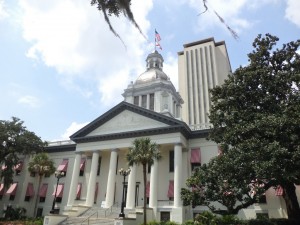Update, 1/14: A reader has alerted us to an important bill for students with dyslexia that didn’t make the initial list. If you think we missed an important issue, please let us know.
It’s an election year. Lawmakers are convening two months earlier than usual. A trio of special sessions and dragged-out fight over redistricting consumed a lot of bandwidth last summer and fall.
 There are plenty of reasons to expect a light education agenda as Florida’s annual 60-day session begins today.
There are plenty of reasons to expect a light education agenda as Florida’s annual 60-day session begins today.
But a closer look at the agenda reveals a wide range of measures that could change the educational choice landscape in Florida and create new options for students — including some that fell by the wayside after last year’s early adjournment.
The bills below don’t comprise an exhaustive list of school choice bills that have been filed. But they’re the ones worth watching. Either they’re likely to pass, they’re likely to trigger interesting debates, or they attempt to raise issues that, if they’re not addressed in the next two months, are likely to surface in the future.
Charter schools. The House has shuffled a litany of charter school provisions — a new path to high-performing charter expansion, the creation of a charter school institute, new rules for “high-impact” charters in low-income areas, clearer standards for reviewing charter applications — into a single bill. So far, it’s picked up bipartisan support, and the real question is what will happen in the Senate. HB 7029/SB 830
Personal Learning Scholarship Accounts. Bills set for floor votes this week would expand Florida’s newest educational choice program for special needs students and create new college options. SB 672/HB 7011 are part of a larger package of bills, backed by Senate President Andy Gardiner, intended to help people with special needs.
McKay Scholarships. HB 837/SB 1088 would allow more students to qualify for the state’s McKay Scholarships for special needs students. Among other things, they would allow students between the ages of 17 and 22 to use the scholarships for transition-to-work programs at private schools.
Charters and the constitution. SB 976/HB 759 would amend the state’s constitution to create a statewide process for charter school authorizing, a power currently confined to school districts. A heavy lift this year, perhaps, this is likely the first, not the last, we’ll hear of this idea.
City-sponsored charters. In the wake of a Tampa Bay Times investigation of academic turmoil in Pinellas County schools, Republican Sen. Jeff Brandes and Democratic Rep. Darryl Rouson, both from St. Petersburg, have filed bills that would let cities sponsor their own charters. Right now, only school boards have that power. SB 808/HB 1255
Blended learning. Brandes is also teaming with House Choice and Innovation Chairman Manny Diaz, R-Hialeah, on a simple-looking bill that could give public schools significantly more latitude to experiment with blended learning. HB 4013/SB 470
Competency-based education. Brandes and Rep. Ray Rodrigues, R-Estero, have proposed a pilot program that would give three Florida school districts the ability to experiment with competency-based education. HB 1365/SB 1714
Advanced courses. A little-discussed portion of the Senate’s sweeping testing proposal (SB 1360) would let students meet course requirements by passing Advanced Placement exams. Meanwhile, SB 890/HB 693 would provide schools extra funding for students who receive Advanced Placement Capstone Diplomas, and SB 982/HB 443 would increase the maximum bonus for teachers whose students earn AICE diplomas.
Public school choice. Several proposals (HB 669/SB 684/SB 886) would revive and slightly tweak a measure from last year, which would have allowed parents to enroll their children in any public school in the state that had room.
State budget. Among the funding issues expected to come up later in the session: How much money will charter schools get for facilities? And how will lawmakers handle funding for the state’s Voluntary Pre-Kindergarten program, which is one of the state’s most popular forms of school choice?
Home schooling. SB 1552/HB 835 would expand the rights of home schoolers by, among other things, giving them more access to career education. It would also create new textbook allowances for home schooling families.
Class size. A measure by Senate Education Chairman John Legg, R-Trinity, (SB 1634) would require school districts to specify why the schools they dub “schools of choice” are truly innovative. It would create similar requirements for charter schools.
Collegiate high schools. Another bill by Legg, SB 1076, would bar districts from limiting enrollment in collegiate high school programs, which were expanded under an initiative he backed two years ago.
Computer coding. Measures in the House and Senate would let students use computer science courses to meet the state’s foreign language requirements. Some supporters say this idea is really about choice and customization. SB 468/HB 887
Principal autonomy. SB 434/HB 287 revive an effort to give greater autonomy to principals in district schools, similar to what their counterparts in charter schools enjoy.
Dyslexia pilot. SB 472/HB 377 would create a new, choice-based pilot program with specialized schools for students with dyslexia, modeled after a new program in Jacksonville.



There is a Dyslexia Pilot Bill that deserves to pass this session. It would allow five districts to create a dyslexia school program with the support of GRASP Academy in Jacksonville. GRASP has been very successful with closing the gap for these children whose support service needs (specifically Orton Gillingham based literacy therapy) are not being met in the public school system as they should be.
Great point, Sue. We wrote that up here: https://nextstepsblog.org/2015/10/bill-would-create-new-choice-schools-for-florida-students-with-dyslexia/ and I will add it above because it definitely belongs on the list.